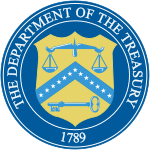This article needs additional citations for verification. (January 2022) |

The Community Development Financial Institutions Fund (CDFI Fund) promotes economic revitalization in distressed communities throughout the United States by providing financial assistance and information to community development financial institutions (CDFI). The CDFI Fund was originally established as an independent government corporation through the Riegle Community Development and Regulatory Improvement Act of 1994.[1][2] Congress promptly moved the CDFI Fund under United States Department of the Treasury in a 1995 reconciliation bill.[2] Financial institutions, which may include banks, credit unions, loan funds, and community development venture capital funds, can apply to the CDFI Fund for formal certification as a CDFI.
In March 2025, President Trump issued an executive order that directed that the CDFI Fund be eliminated "to the maximum extent consistent with applicable law", along with several other agencies.[3][4][5]
History
[edit]As of September 1, 2005, there were 747 certified CDFIs in the U.S. The CDFI Fund offers a variety of financial programs to provide capital to CDFIs, such as the Financial Assistance Program, Technical Assistance Program, Bank Enterprise Award Program, and the New Markets Tax Credit Program.[6]
One of the oldest nonprofit loan funds in the United States, Enterprise Community Loan Fund - a subsidiary of Enterprise Community Partners has loaned more than $725 million to help build or renovate 91,000 affordable homes. They also offer local funds in Atlanta, Louisiana, Los Angeles, and New York City. Other, larger nonprofit loan funds have typically invested nearly $2 billion per loan fund (as of 2017) including Low Income Investment Fund, Boston Community Capital, Reinvestment Fund, Capital Impact Partners, Local Initiatives Support Corp and Self-Help. Within the field, only a handful of CDFIs have achieved an investment grade rating from Standard & Poor - including Local Initiative Support Corp, Reinvestment Fund, Capital Impact Partners.
In 1998, City First Bank was certified as Washington, DC's first CDFI bank. Since then, and as of December 31, 2015, City First has channeled over $1 billion of capital into low and moderate income communities. $422 in New Markets Tax Credits have helped to build institutions such as THEARC in southeast DC where over 80% of the students qualify for free or reduced lunch; and the Atlas Performing Arts Center, making arts accessible to all on the now burgeoning H Street in northeast DC. Loans towards small businesses, affordable housing, educational facilities, the arts, and health centers have totaled $591, fueling DC's renewed economy and culture.
See also
[edit]References
[edit]- ^ Gonzalez, Henry B. (1994-09-23). "H.R.3474 - 103rd Congress (1993-1994): Riegle Community Development and Regulatory Improvement Act of 1994". www.congress.gov. Retrieved 2022-01-22.
- ^ a b Lowry, Sean (January 25, 2018). Community Development Financial Institutions (CDFI) Fund: Programs and Policy Issues (PDF) (Report). Retrieved May 27, 2025.
- ^ "Continued Reduction of the Federal Bureaucract". The White House. March 14, 2025. Retrieved 2025-03-16.
- ^ Bianco, Ali (2025-03-15). "Trump's next agency cuts include US-backed global media, library and museum grants". POLITICO. Retrieved 2025-03-16.
- ^ Pager, Tyler (2025-03-15). "Trump Orders Gutting of 7 Agencies, Including Voice of America's Parent". The New York Times. ISSN 0362-4331. Retrieved 2025-03-16.
- ^ "CDFI Program". www.cdfifund.gov. Retrieved 2022-01-22.
External links
[edit]
